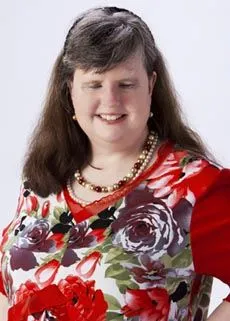Accessible documentation
Written by

Kylee Maloney, a specialist in accessible documentation, recently attended her first Arts For All Wellington Network workshop and described the network “as a great forum for networking and empowering people”.
Kylee, who is blind, was a member of a workshop group discussing ideas about developing accessibility policies and action plans for art organisations.
Kylee Maloney, a specialist in accessible documentation, recently attended her first Arts For All Wellington Network workshop and described the network “as a great forum for networking and empowering people”.
Kylee, who is blind, was a member of a workshop group discussing ideas about developing accessibility policies and action plans for art organisations.
“Access is about choice,” she says. “As soon as people have choice, they have power and they have control over their own lives.”
Kylee told the group that accessible documentation is “easier to create than you think. I focus on best practice and good design for everyone. That principle is much easier for organisations to swallow and a more positive approach than the World Wide Consortium (W3C) standards.”
"So much scope for discussion"
Of the network workshop, Kylee says: “There was so much scope for discussion and it was heartening to see the enthusiasm among the participants. It’s great to bring everyone together from both the arts and disability sectors to learn from each other. I’m very much looking forward to the next gathering of the network.”
Kylee runs Silver Chords, an accessible documentation consultancy, and also works on contract as a web content writer and information architect to Lonsdale Media, a web development business.
“My vision statement on my website is that one day, I hope to be redundant – that accessible documents and websites will be the norm and I won’t be needed,” she says.
Initially trained as a typist, Kylee says that her move into accessible documentation was about breaking old habits.
Breaking old habits
“I did a lot of research on accessible documentation and broke 30 years of habits. Now I tell my trainees, ‘If this old typist can change, you can change’.
“As a typist, you’re trained to do things that aren’t very accessible – like using different fonts as a visual indicator of headings. But a computer can't tell your fancy font style is a heading unless you tell it by using the appropriate heading style. That's just part of what makes a document accessible. When all the style and content elements are in place, your document can be converted into lots of different formats. Now that’s real usability.”
Kylee has a history of embracing change and being adaptable. Along with establishing herself as a consultant, she is an accomplished folk musician, and was once an award-winning presenter and producer of One in Five, a Radio New Zealand programme about disability issues.
In 2006, she received a Voice Award sponsored by the US Department of Health and Human Services and the Writers Guild of America West. The award honours people who have given voice to people with mental health issues.
Embracing mental health
“That was fantastic!” Kylee says of the award ceremony, held in Los Angeles. “They were impressed by my interview with Victoria Maxwell, who has a form of bipolar disorder and wrote a one-woman show called Crazy for Life. Her show was about embracing mental health as a part of who you are, and not letting it be a stigma on your character.”
Kylee has also had her own battle with depression. “I've never fitted into a category. I had to find my own ways so that I could change my condition. It’s a lot about self-empowerment.
“You have to change direction. Doors close, and you can’t sit around waiting for others to open. You have to look around for other options. It’s lucky I’m a nosey, curious person. I haven’t run out of interests and I continue to be fascinated by life!”
